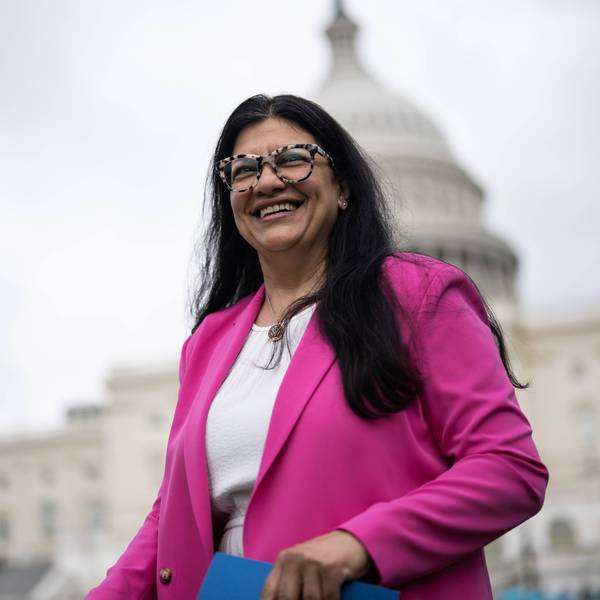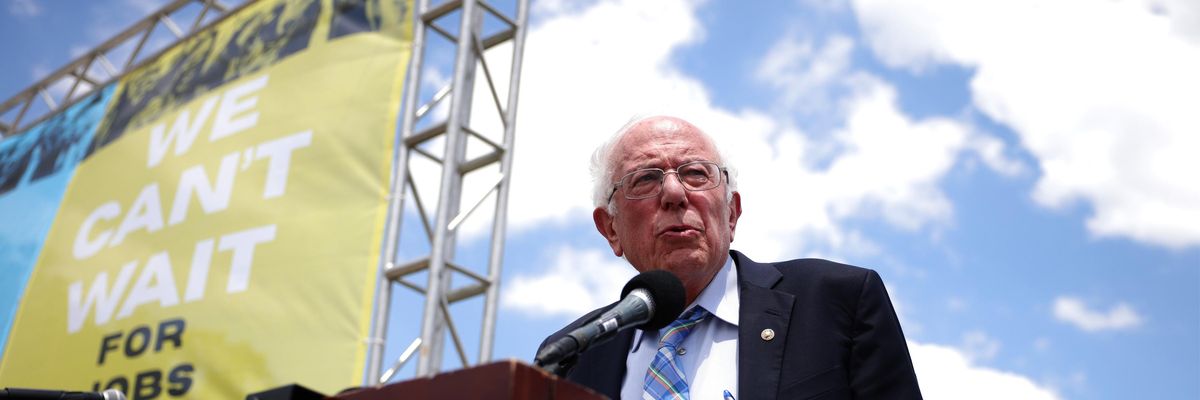Sen. Bernie Sanders described the $3.5 trillion budget resolution that he and Senate Democrats unveiled Monday as the starting point for the most impactful social spending legislation introduced in the U.S. since the 1930s, when then-President Franklin D. Roosevelt pushed New Deal reforms to combat the Great Depression, empower workers, and provide sustained relief to the vulnerable.
"We need to rebuild our roads and bridges, but more important is the need to address the crises facing working families all over this country."
--Sen. Bernie Sanders
"For too many decades, Congress has ignored the needs of the working class, the elderly, the children, the sick, and the poor," Sanders (I-Vt.) said in a statement. "Now is the time for bold action. Now is the time to restore faith in ordinary Americans that their government can work for them, and not just wealthy campaign contributors."
As chairman of the Senate Budget Committee, Sanders played a central role in winning the inclusion of key progressive priorities in the budget resolution, which establishes the outer boundaries of an eventual legislative package that Democrats hope to pass using the filibuster-proof reconciliation process.
The resolution, which still must be converted into legislative text, outlines a package that would be sweeping in scope, touching major areas of U.S. society including healthcare, climate, housing, and immigration.
In its current form, the framework proposes:
- Lowering the Medicare eligibility age (the document provided by Senate Democrats does not specify an age) and expanding the program's benefits to include dental, vision, and hearing;
- A pathway to citizenship for millions of undocumented immigrants;
- Funding for a Civilian Climate Corps, a public works program inspired by the New Deal's Civilian Conservation Corps;
- An expansion of the boosted Child Tax Credit;
- Investments in affordable housing;
- Paid family and medical leave;
- Universal pre-K for three- and four-year-olds; and
- Tuition-free community college.
The proposed spending would be financed by tax hikes on the wealthy and large corporations, and by boosting Internal Revenue Service funding to help the agency pursue rich tax cheats. The budget resolution also proposes allowing Medicare to negotiate prescription drug prices directly with pharmaceutical companies, a plan that Senate Democrats believe would save the federal government hundreds of billions of dollars.
"These are investments our communities need and want. We can't pass up our opportunity to deliver them."
--Congressional Progressive Caucus
"The $3.5 trillion budget resolution that I am introducing today will allow the Senate to move forward on a reconciliation bill that will be the most consequential piece of legislation for working people, the elderly, the children, the sick, and the poor since FDR and the New Deal of the 1930s," said Sanders. "It will also put the U.S. in a global leadership position to combat climate change and make our planet healthy and habitable for future generations."
"Further, and importantly, this legislation will create millions of good paying jobs as we address the long-neglected needs of working families and saving the planet," Sanders continued. "Today, with Democrats in control of the Senate, we will use reconciliation to benefit the working class, not the billionaire class."
In a floor speech on Monday, Sanders presented the $3.5 trillion resolution as a necessary departure from decades of congressional inaction in the face of widespread poverty, massive and growing economic inequality, and the climate emergency.
"For a very, very long time, Congress has catered to the needs of those who have the money and the power, and we have turned our backs on tens of millions of fellow Americans who are struggling to put food on the table, take care of their kids, take care of their parents, and pay for the healthcare and the prescription drugs that they desperately need. Well, that changes today," Sanders said. "Further, above and beyond that, we have not only ignored the economic crises facing working families, we have ignored the great existential threat of our time, and that is climate change."
The Vermont senator went on to argue that it's not necessary to read the Intergovernmental Panel on Climate Change's new report to understand that the climate crisis represents an immediate and grave danger to the U.S. and the rest of the world.
"Open up your eyes," said Sanders.
Sanders unveiled the budget resolution as the Senate is on the verge of passing a separate $550 billion bipartisan infrastructure package that progressives have criticized as woefully inadequate. Members of the Congressional Progressive Caucus (CPC) have signaled that they will not vote for the bipartisan package unless it is accompanied by a bold reconciliation bill that meets their demands.
Observers were quick to point out some notable proposals that were omitted from the resolution, from a debt ceiling increase to an extension of soon-to-expire unemployment benefits.
Nevertheless, the CPC expressed support for the newly unveiled resolution in a tweet on Monday, noting that "these are investments our communities need and want."
"We can't pass up our opportunity to deliver them," the CPC added.
Majority Leader Chuck Schumer (D-N.Y.) said Monday that the Senate will "immediately move" to pass the budget resolution after the chamber approves the bipartisan bill this week.
Once the Senate and House approve an identical budget resolution, congressional committees will begin the process of converting top-line spending figures into legislative provisions--a time-consuming process that could be made more difficult by conservative Democrats who object to the $3.5 trillion price tag. The newly released reconciliation instructions say Senate committees must submit legislation by September 15.
Sen. Kyrsten Sinema (D-Ariz.) announced last month that she opposes that level of spending, and other Democrats have expressed reservations about the proposal. To become law, the emerging reconciliation package will need the support of every member of the Senate Democratic caucus.
In his floor remarks on Monday, Sanders said his view is that the $3.5 trillion resolution "doesn't go as far as it should, but it is a major step forward in transforming our energy system away from fossil fuel to energy efficiency and sustainable energy."
"We are now in the midst of a debate over the physical infrastructure, the bipartisan bill--very important," the Vermont senator said. "We need to rebuild our roads and bridges, but more important is the need to address the crises facing working families all over this country. When we go forward and do that, when we protect our children and the elderly and the environment, we are going to create millions of good-paying jobs, put people to work rebuilding this country in a way that is long, long overdue."




